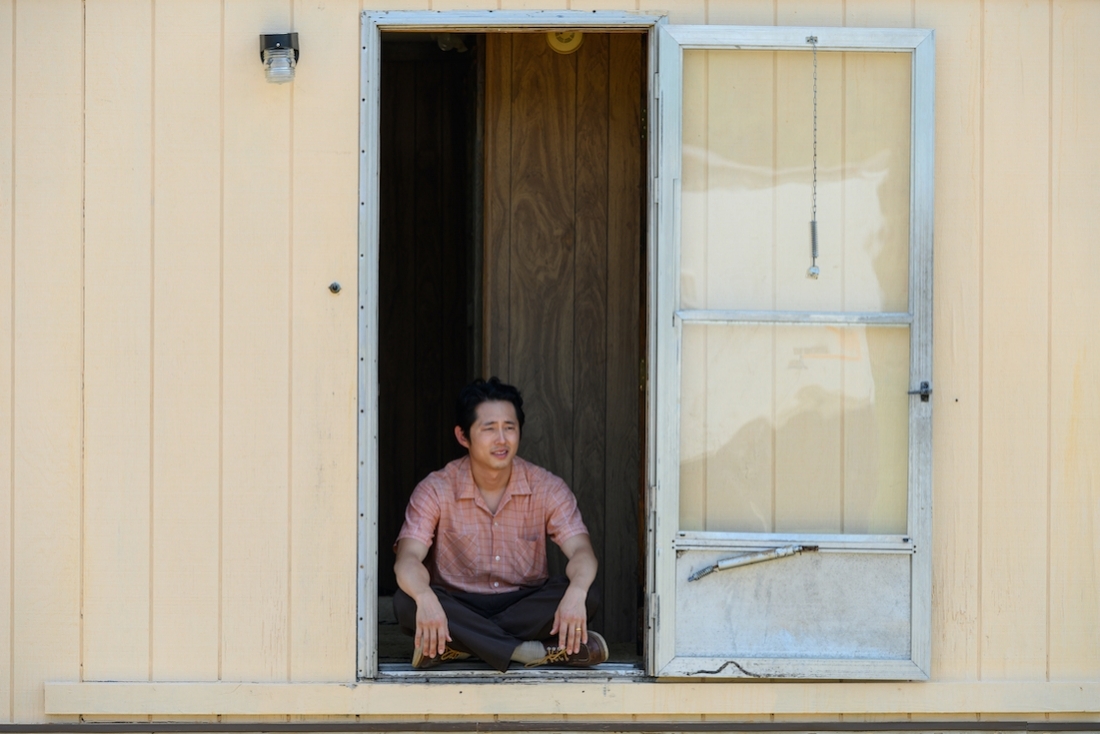

Of the many films I’ve watched about family and hope, the Academy Award nominated Minari, truly stands apart. As the film opens, we see a Korean family — Jacob (Steven Yuen), his wife Monica (Han Ye-ri), and their two kids, elder daughter Anne (Noel Cho) and son David (Alan Kim) — driving through a remote area in America. Soon a vast, isolated field of green fills the screen, with a house on wheels in the middle. I found myself mirroring the expressions of Monica as the family gets out of the car to see their new home, tinged with silent bewilderment. Jacob’s ambition, seeped in the American dream, to become a farmer of Korean vegetables for Korean immigrants in America, has led them here, and from the very beginning, it is clear that this new chapter in this family’s life will be replete with struggles. The isolation, little David’s heart condition, lack of money and no one to take care of the kids while their parents work at a chicken hatchery, where they segregate chicken on the basis of their sex, eventually leads to a dispute. The heart-wrenching scene of the kids making paper planes with Don’t Fight written on it and throwing them in the room where their parents are fighting, felt like a flashback, as versions of this scene have perhaps been lived by everyone at least once in their childhood. I believe that it was this scene that suddenly made me realise how raw, authentic and absorbing Minari is as a film, and this was just the beginning.
The narrative is propelled further when Ye-Ri’s mother arrives to help her. Her arrival also marks the first time we hear the film’s title Minari and get acquainted with it. Minari is an edible plant, a type of celery, also known in India as Indian Pennywort. The plant is weed-like in its growth, it thrives even in rough soil and requires lesser attention. As Jacob farms on the big land with the help of Paul (Will Patton), a devout Christian White man, the grandmother goes and plants a little patch of Minari with David. The film then goes on to depict aspects like religion, the immigrant experience and the generational disconnect with a slice-of-life, classical quality, that makes this film brilliant and moving.
It is said that the first crop of Minari plants is generally a failure. Even though it grows in rough soil, its first crop dies because the plant itself is invested in purifying the soil and the water it grows in. So the second harvest, is successful. This is perhaps a larger metaphor for the family and their experiences as immigrants with the American dream. The first time around, many disasters befell them. The bond between Ye-Ri and Jacob gets more and more tense and their family eventually finds itself being torn apart. Jacob’s own hard work is met with drought that endangers his produce. In biblical fashion, both flood (a tornado) and fire, threaten to devastate their home and hard work. However, after these catastrophic experiences, the second time around, the family comes together and becomes even stronger.
As the film is a semi-autobiography of writer-director Lee Issac Chung, who also grew up on a farm in Arkansas, similar to the place where the family in the film move to and settle, the deep and quiet sentimentality that runs through the narrative becomes even more scintillating. Nothing is shoved in the viewer’s face as revelatory, and nothing shown on the screen is without meaning. Every frame, every dialogue, every movement and expression in the film guided is by simplicity and tenderness. The events unfold, the story is told, mostly from the perspective of little David, and the viewer is allowed ease and space to be a part of the story and its universality. Every actor in the film has done a remarkable job, and every character in the film, with their struggles and faults, becomes endearing by the end of the film. As we are amidst a pandemic, having been isolated with our own demons, and families, Minari is perhaps a film of hope that can help us all. It is a film about filial relationships and struggles that makes you realise the importance of bonds in our lives, and the need to keep moving forward.
The film has now been released in theatres in India by PVR Cinemas.
Text Nidhi Verma
Date 16-04-2021